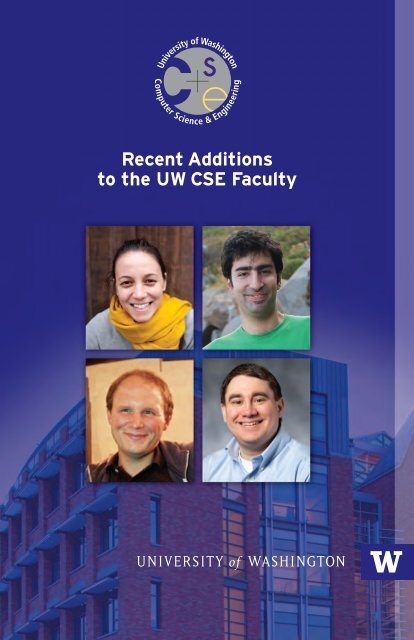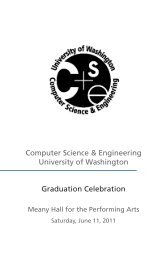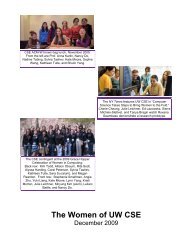Recent Additions to the UW CSE Faculty - University of Washington
Recent Additions to the UW CSE Faculty - University of Washington
Recent Additions to the UW CSE Faculty - University of Washington
Create successful ePaper yourself
Turn your PDF publications into a flip-book with our unique Google optimized e-Paper software.
<strong>Recent</strong> <strong>Additions</strong><br />
<strong>to</strong> <strong>the</strong> <strong>UW</strong> <strong>CSE</strong> <strong>Faculty</strong>
<strong>University</strong> <strong>of</strong> Washing<strong>to</strong>n Computer Science & Engineering – long<br />
regarded as one <strong>of</strong> <strong>the</strong> <strong>to</strong>p ten programs in <strong>the</strong> nation – is taking<br />
advantage <strong>of</strong> new investments by <strong>the</strong> State <strong>of</strong> Washing<strong>to</strong>n and <strong>the</strong><br />
<strong>University</strong> <strong>of</strong> Washing<strong>to</strong>n <strong>to</strong> make game-changing faculty hires.<br />
Located in one <strong>of</strong> <strong>the</strong> world’s most vibrant high-tech regions, <strong>UW</strong><br />
<strong>CSE</strong> is committed not only <strong>to</strong> leadership in core computer science,<br />
but also <strong>to</strong> leadership in research and education with direct impact<br />
on national and global challenges – challenges such as education,<br />
energy, biology, healthcare, transportation, scientific discovery, and<br />
<strong>the</strong> use <strong>of</strong> technology in developing regions. <strong>UW</strong> <strong>CSE</strong> has achieved<br />
great success and impact through activities that make technology<br />
better, and through activities motivated by how innovations are put<br />
<strong>to</strong> work.<br />
Outstanding people are essential <strong>to</strong> fulfilling this commitment.<br />
This year <strong>CSE</strong> has made four new hires that add significant<br />
strengths in key areas. Our three junior hires – Maya Cakmak,<br />
Shayan Oveis Gharan, and Zach Tatlock – greatly add <strong>to</strong> our<br />
existing strengths in robotics, <strong>the</strong>oretical computer science, and<br />
programming languages and verification. Our senior hire, Matt<br />
Reynolds – <strong>the</strong> fourth hire in our joint ExCEL (“Experimental<br />
Computer Engineering Lab”) initiative with Electrical Engineering<br />
– complements o<strong>the</strong>r recent additions <strong>to</strong> put us at <strong>the</strong> forefront <strong>of</strong><br />
low-power and ubiqui<strong>to</strong>us computing.<br />
Our recent growth makes it an exciting time for Computer Science<br />
& Engineering at <strong>the</strong> <strong>University</strong> <strong>of</strong> Washing<strong>to</strong>n, and we expect <strong>to</strong><br />
continue making significant additions over many years <strong>to</strong> come.
Matt Reynolds, Associate Pr<strong>of</strong>essor<br />
Formerly <strong>the</strong> Nortel Networks Assistant Pr<strong>of</strong>essor in Electrical and<br />
Computer Engineering at Duke <strong>University</strong>, Matt Reynolds joins <strong>the</strong><br />
<strong>University</strong> <strong>of</strong> Washing<strong>to</strong>n this fall with a joint position in Computer<br />
Science & Engineering and Electrical Engineering.<br />
Matt’s research, which has resulted in five best paper awards, focuses<br />
on ultra-low power sensing and computation, RFID, wireless power<br />
transfer, biomedical applications, and smart materials and surfaces.<br />
He is a Senior Member <strong>of</strong> <strong>the</strong><br />
IEEE and has served as General<br />
Chair and Technical Program<br />
Committee Co-chair <strong>of</strong> <strong>the</strong><br />
IEEE International Conference<br />
on RFID.<br />
In addition <strong>to</strong> his academic<br />
pursuits, Matt is an<br />
accomplished entrepreneur,<br />
having co-founded three<br />
companies: ThingMagic (acquired by Trimble Navigation), Zensi<br />
(acquired by Belkin), and SNUPI Technologies. Matt holds fourteen<br />
patents, with more than 30 pending. He received his S.B., M.Eng.,<br />
and Ph.D. degrees from MIT, where he was a Mo<strong>to</strong>rola Fellow at<br />
<strong>the</strong> MIT Media Lab.
Maya Cakmak,<br />
Assistant Pr<strong>of</strong>essor<br />
Maya Cakmak received her Ph.D. in Robotics from <strong>the</strong> Georgia<br />
Institute <strong>of</strong> Technology in 2012. Since <strong>the</strong>n, she has been a postdoc<strong>to</strong>ral<br />
research fellow at Willow Garage – one <strong>of</strong> <strong>the</strong> most<br />
influential robotics companies in <strong>the</strong> world.<br />
Maya’s research interests are at <strong>the</strong> intersection <strong>of</strong> Human-Robot<br />
Interaction and Programming by Demonstration. Her research aims <strong>to</strong><br />
develop functionalities and interfaces for personal robots that can be<br />
programmed by <strong>the</strong>ir end-users <strong>to</strong> assist everyday tasks. Maya’s <strong>the</strong>sis<br />
developed algorithms and interaction methods <strong>to</strong> allow robots <strong>to</strong> ask<br />
questions as <strong>the</strong>y learn from<br />
<strong>the</strong>ir users. Her work was<br />
evaluated with extensive user<br />
studies which involved real<br />
human-robot interactions. As<br />
a post-doc<strong>to</strong>ral researcher she<br />
continued her work on making<br />
robot programing intuitive for<br />
end-users.<br />
Maya’s work has been<br />
published at major Robotics and<br />
AI conferences and journals,<br />
demonstrated live in various<br />
venues, and featured in numerous media outlets, including National<br />
Geographic, New York Times, and NOVA Science.
Shayan Oveis Gharan,<br />
Assistant Pr<strong>of</strong>essor<br />
Shayan Oveis Gharan received his Ph.D. from Stanford <strong>University</strong> in 2013.<br />
He is a recipient <strong>of</strong> several awards including a Stanford Graduate<br />
Fellowship, a Miller Fellowship, and best paper awards at SODA 2010<br />
and FOCS 2011. Shayan will spend a year as a Miller Fellow at UC<br />
Berkeley before joining <strong>UW</strong><br />
Computer Science & Engineering<br />
in <strong>the</strong> 2014-15 academic year.<br />
Shayan’s work involves designing<br />
efficient algorithms for highimpact<br />
optimization problems.<br />
Many <strong>of</strong> <strong>the</strong> most important<br />
optimization problems seem<br />
intractable, and simple<br />
exhaustive search algorithms<br />
require trillions <strong>of</strong> years <strong>to</strong><br />
compute an optimal solution<br />
even if <strong>the</strong>y use all available<br />
computing power. The real challenge is <strong>to</strong> develop ma<strong>the</strong>matical <strong>to</strong>ols<br />
that help us in designing efficient algorithms <strong>to</strong> determine an optimal<br />
or a near-optimal solution.<br />
Shayan has worked on a variety <strong>of</strong> classical optimization problems<br />
including <strong>the</strong> Traveling Salesman and Graph Clustering problems.<br />
He has introduced several new techniques, like maximum entropy<br />
rounding by sampling and <strong>the</strong> use <strong>of</strong> higher eigenvalues <strong>of</strong> graphs,<br />
that can be used <strong>to</strong> tackle an array <strong>of</strong> o<strong>the</strong>r computational tasks as<br />
well. His work on <strong>the</strong> Traveling Salesman problem yielded <strong>the</strong> first<br />
improvements in over 30 years.<br />
Illustration: Robert Bosch
Zach Tatlock,<br />
Assistant Pr<strong>of</strong>essor<br />
Zach Tatlock completed his Ph.D. at <strong>the</strong> <strong>University</strong> <strong>of</strong> California,<br />
San Diego in summer 2013 and joins <strong>UW</strong> Computer Science &<br />
Engineering this fall.<br />
As our dependence on s<strong>of</strong>tware grows, so <strong>to</strong>o do <strong>the</strong> risks posed by<br />
programming errors. Broadly, Zach’s research aims <strong>to</strong> mitigate <strong>the</strong>se<br />
risks by improving s<strong>of</strong>tware reliability and security. To address <strong>the</strong>se<br />
challenges, he has developed several<br />
new techniques <strong>to</strong> ensure program<br />
correctness in domains ranging from<br />
web browsers and databases <strong>to</strong><br />
compiler optimizations. In addition <strong>to</strong><br />
providing new formal verification<br />
techniques, Zach’s work leads <strong>to</strong> practical<br />
<strong>to</strong>ols with <strong>the</strong> potential <strong>to</strong> help<br />
s<strong>of</strong>tware developers in real settings.<br />
His work on program verification has<br />
leveraged and extended a variety <strong>of</strong> technologies from <strong>the</strong><br />
programming languages community, including ma<strong>the</strong>matical <strong>the</strong>orem<br />
provers and type systems. He uses <strong>the</strong>se techniques <strong>to</strong> build systems<br />
with proven guarantees, most notably Quark, a web browser with<br />
a formal, machine-checked pro<strong>of</strong> guaranteeing several important<br />
security properties, e.g. that different browser tabs cannot negatively<br />
affect each o<strong>the</strong>r. A key technique in his work is identifying highleverage<br />
interfaces at which <strong>to</strong> prove deep properties so that most <strong>of</strong> a<br />
system can remain untrusted while still providing strong guarantees.
http://www.cs.washing<strong>to</strong>n.edu/
Computer Science & Engineering<br />
<strong>University</strong> <strong>of</strong> Washing<strong>to</strong>n<br />
Box 352350<br />
Seattle, WA 98195-2350<br />
http://www.cs.washing<strong>to</strong>n.edu/




